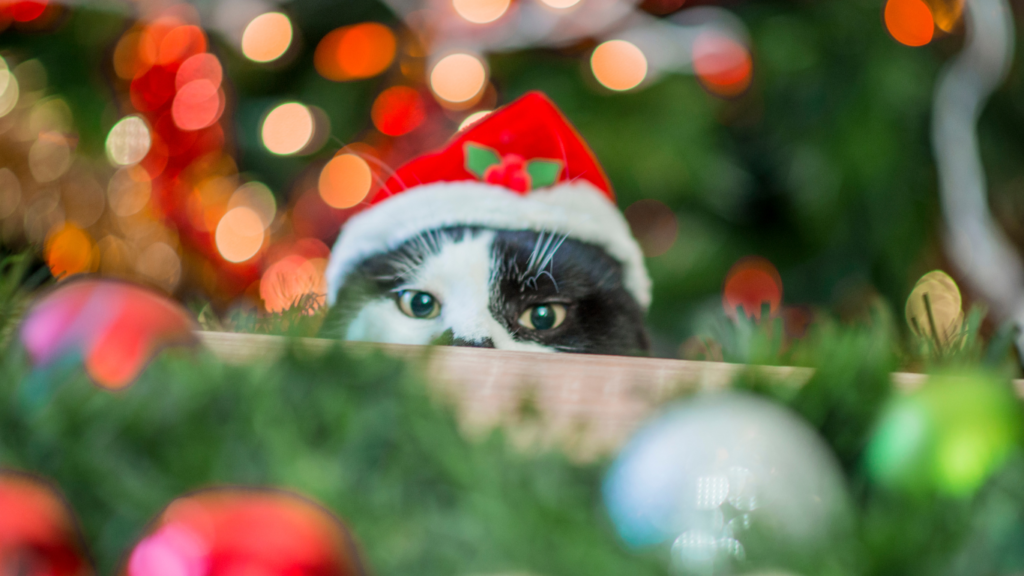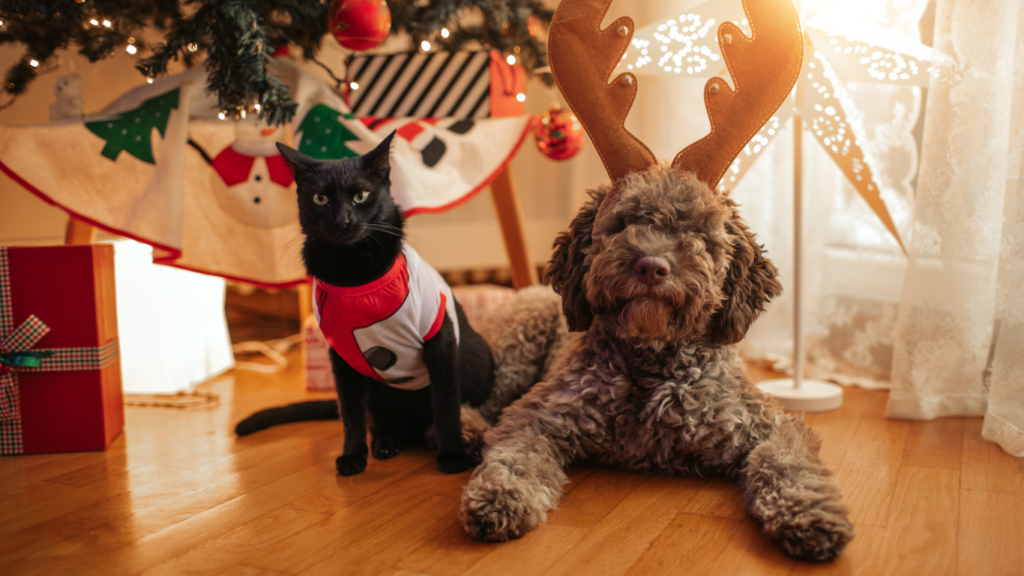As we plan for Christmas, with shopping, eating, gifting, time with family, we need to remember our furry family members and keeping pets safe during Christmas.
It’s essential to remember that our pets may need special attention to ensure their safety and well-being. Christmas, in particular, poses various dangers and hazards for our pets, and we want to keep them safe and well too during the festivities. With some planning and care, you can do that.
This post may contain affiliate links, which if you click through to and make a purchase, I will earn a small amount of revenue. These will be marked with * for your reference.

Things you need to think about and be aware of are:
- Pet-Friendly Gift Wrapping:When wrapping presents, consider the following to keep your pets safe:
- Avoid Ribbon and String: Cats, in particular, are attracted to shiny, dangling objects. However, ribbon and string can cause intestinal blockages if ingested.
- Non-Toxic Wrapping Paper: Choose wrapping paper made from non-toxic materials, as some inks and dyes can be harmful to pets if chewed.
- Toxic Plants: Many common Christmas plants can be toxic to pets. Be cautious with plants like poinsettias. These festive plants can cause mild to moderate gastrointestinal upset if ingested by pets. Mistletoe and Holly: Both can be highly toxic to pets, leading to severe health issues. Keep them out of reach or opt for artificial alternatives.
- Candles and Open Flames: Candles can make your home feel cosy and add atmosphere and ambience, but they can be dangerous to curious or active pets. You should always supervise open flames and never leave candles unattended, especially if you have pets that can knock them over. Consider Flameless Candles* and opt for flameless candles to create a safe environment without the risk of fire.
- Festive Foods: We all love Christmas food but some of what we enjoy is not safe for pets at all. Whilst it might be fun and seem harmless to let your pet nibble on human Christmas treats, it could actually do them more harm than good, so be aware of what could make them unwell or even in some case, be fatal, and stick to treats* you know are safe for them. Avoid feeding pets rich and fatty foods, as they can lead to pancreatitis. Do not give pets cooked bones, as they can splinter and cause choking or digestive issues. It is probably best to tell your guests not to feed pets without your permission and you may have to remind them, even if your pet is begging and looking as endearing as can be.
- Quiet Spaces for Pets:The hustle and bustle of Christmas gatherings can be overwhelming for pets. Create a quiet and safe space where they can retreat to if they feel stressed. Place their favorite toys, blankets, or beds in their designated quiet space and make sure you inform guests about your pets and set some ground rules to ensure a less stressful environment for your pets. Make sure you and any guests respect boundaries, around your pet. If your pet is shy or anxious, ask guests to give them space and not force interactions and make sure children are aware of how to interact, or not, with your pets.
- Be ready for emergencies: Be prepared for unforeseen circumstances and make sure your pet insurance is up to date and you know what hours your vet is available over Christmas and if they are not open, where the local emergency vet is. Hopefully you won’t need it, but being prepared is always half the battle. It’s also a good idea to have a pet first aid kit, to hand, as well, for simple treatments you can administer at home.
- Christmas Trees: Ensure your Christmas tree is securely anchored to prevent it from toppling over if your pet decides to investigate. Consider using a gate to create a barrier around the tree and make sure to avoid using decorations that can be easily chewed or swallowed. Opt for pet-safe ornaments and decorations made of non-toxic materials. We had a tail of woe our first Christmas with Layla, and learned our lesson at the cost of a vet visit, an operation and a vet bill. Thankfully she was ok but we realised certain decorations were just not pet safe.
- Lights and Cords: Keep electrical cords and Christmas lights out of your pet’s reach. Chewing on cords can lead to electric shock or ingestion of dangerous materials.

It can feel like extra work, keeping pets safe during Christmas but better to be safe than sorry. Our pets are family, and looking after them during all the Christmas fun will keep them happy, protected from hazards and also prevent unplanned trips to the vet and large vet bills.
Have we missed anything? Feel free to add your advice in the comments.